The crane arm reaches down into the boat, suspending in the air a small trailer containing six hoggets. They bleat softly while being placed carefully onto the pier. The next load hauled out of the vessel is a Citroen Berlingo.
O’Malley Ferries cross from Roonagh Pier, just outside Louisburg in Co Mayo, to Inish Turk everyday, weather permitting. Not only do they facilitate human passengers, but also sheep, vehicles, bales and just about anything else needed on the island.
It costs €2 per sheep per journey and clearly the four-legged provide good business. As well as this consignment coming to the mainland on the morning ferry, two sheep head back on the evening crossing.
On this particular morning in early November, there are a number of people getting off the ferry at Roonagh and also some travelling the hour journey back over to the island. Among those returning is local farmer, fisherman and postman, Jack Heanue.
Jack delivers the island’s post twice a week and like most on Inish Turk, is both a fisherman and a sheep farmer. Apart from some crops grown, sheep farming is the only farming enterprise on the island. There are no longer any cattle kept.
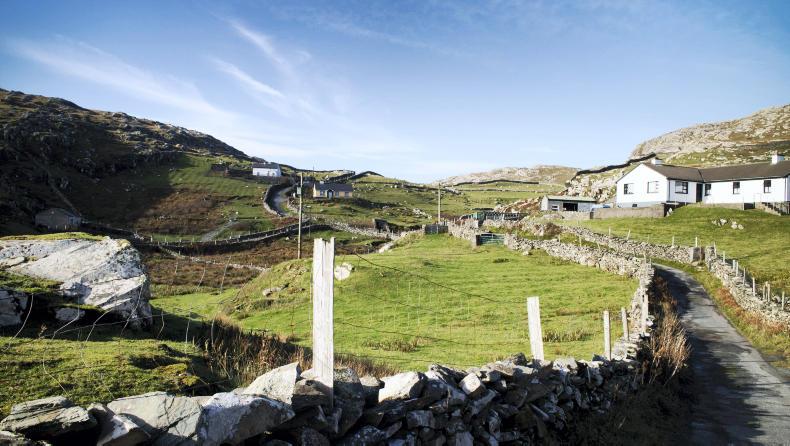
About 60 people live on the island.
“We mostly keep horned mountain sheep, which would be fit to graze on the mountain over the winter. For about 10 years we’ve had no cattle,” explains Jack.
“A gust of bad years came. It was hard and expensive to get hay over. The number of cows went down and the man that had the bull, it didn’t pay to keep it in a lot ways. People started getting into more sheep and that’s the way it is now.”
Inish Turk lies nine miles off the cost of Mayo, in between Clare Island and Inish Boffin. The population stands at just under 60 people.
On the island there is a community centre, a pub, a restaurant, a primary school, a post office, a church, a shop and a football field.
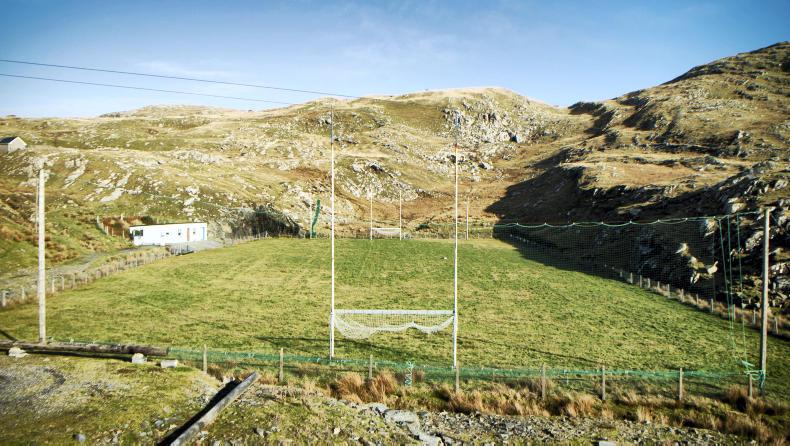
On the island there is a community centre, a pub, a restaurant, a primary school, a post office, a church, a shop and a football field.
Self-sufficiency
With a robust ferry service, nowadays it would be uncommon to become stuck on the island for too long. Jack, who will be 70 his next birthday, says that in his younger years they could have been stranded on the island for weeks.
However, the prospect of being cut off from the mainland doesn’t bother islanders too much. Over the years they have become used to being prepared for all eventualities. Most have a freezer full of meat and blanched vegetables, there would always be plenty of fodder in and the local electrician stocks enough fuel to keep the island’s three generators running.
One of the biggest tasks for islanders to contend with is animal health. “The most important thing we have to do ourselves is be our own vet. We have no vet on the island,” says Jack.
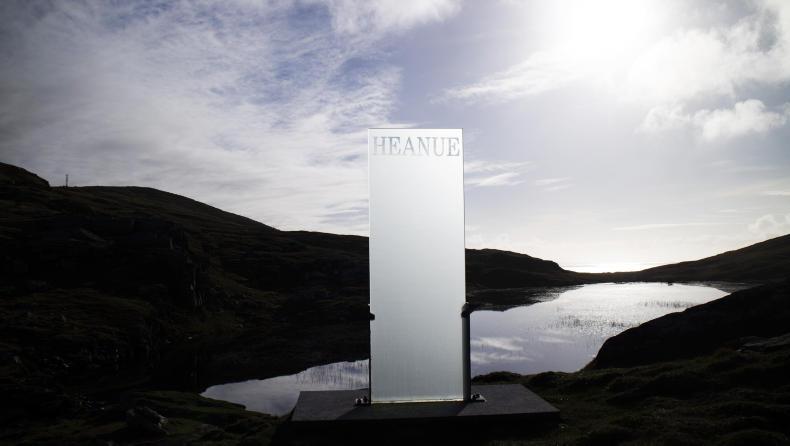
Jack's surname as part of a monument to the island residents, comprising of Inish Turks seven surnames.
“You can’t bring someone over, but you would have all the necessities, injections and things like that. You would always make sure to have them, the day you want it, is not the day to go looking for it.”
In terms of human’s health, on Inish Turk there is a full-time nurse, Maggie from Donegal, who moved to the island a number of years ago with her husband and two young children. She tends to as many ailments as possible, but consults with the doctor on the mainland regarding more serious situations, in deciding whether or not someone needs to go to hospital for example. If so, they are always airlifted by helicopter.
Every three weeks the doctor visits. The priest comes to say mass on Friday evening and Saturday morning every second week in the summer and every third week in the winter. A service is held by the islanders in the church on Sundays.
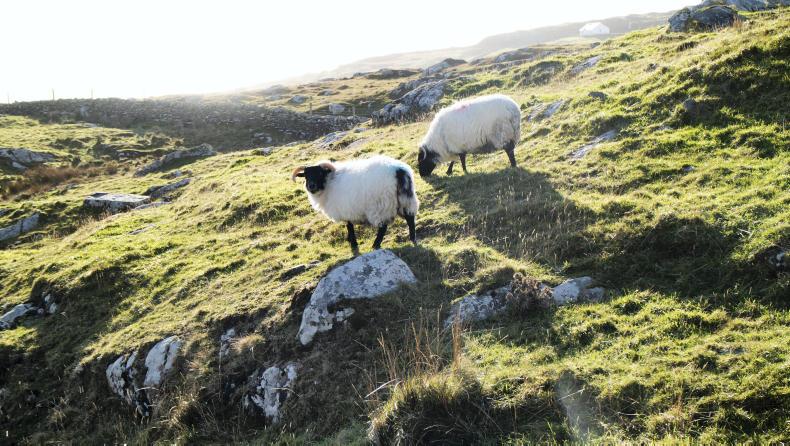
It costs €2 to bring sheep to and from the island with O'Malley Ferries.
School
St Columba’s National School on the island has three pupils and two teachers. As of Budget 2017, any island with a sole one teacher primary school was allocated a second mainstream teacher. The woman who filled that post on Inish Turk is from the mainland, travelling in on a Sunday and out on a Friday.
In the next few years, there are three small children living on the island who are expected to attend the school. When it comes to secondary school, children have to go to the mainland, either Louisburg or Westport, lodging with a family during the week.
You learn a lot of different skills that you wouldn’t on the mainland, to be honest about it. It is a healthy life
Jack and his wife Helen have three grownup children, all living abroad now. For him, sending the children to live on the mainland at a young age is the hardest part of island life. “When it comes to the secondary school at 12 or 13, they go to school out on the mainland, move in with a family and do their five years there. Then they go to college and do another four or five years, next it is off to Australia,” reflects Jack.
“It is hard on them going to the mainland and you do miss them, especially the first one going. Families here have had eight or nine kids and they are all away now, that’s the way with island life.”
Celebrations
Although they are relatively small in numbers, the residents of Inish Turk are never short of something to celebrate. Normally, islanders hold their wedding ceremonies in the local church and the reception in Westport.
However, last year Jack’s daughter became the first person to hold a whole wedding on the island in 50 years. Naturally, all the island’s residents were invited and everyone opened their doors to host guests for the occasion.
Each year Inish Turk fields a team for the All-Island football tournament, which sees nine islands from the west compete. Inish Turk’s GAA pitch is quite famous. A picture of it went viral in recent years, showing it towered on all sides by hills.
Sent off to walk the island in search of the field, this writer is worried she may get lost and miss the boat home. No need, the whole island makes up 2,500 acres and with only one loop road, it is straight forward to navigate.
Jack’s favourite part of island life is by far the events held there annually, such as the seafood festival, ram fair, sheering competition and swimming lesson week in the summer. Overall, island life lends itself to certain challenges, but creates unique learnings too, Jack thinks.
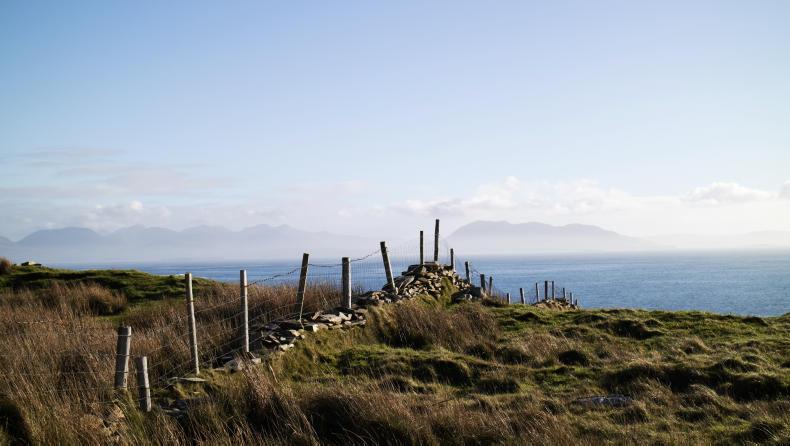
“You learn a lot of different skills that you wouldn’t on the mainland to be honest about it. It is a healthy life. You can walk out and you don’t have to lock your door. You can let your kids wonder around there and you would think they aren’t going to get into any harm. The kids are all fit to paddle their own canoe at a very early stage in their life.
“If you are doing something on the island, you might say, well if I was on the mainland I would have this or that. But you have to make do and you have to use your brain to find another way.”
Read more
Concern that Truly Grass Fed will erode value for dairy farmers - Jordan
Crafting the Wild Atlantic Way
The crane arm reaches down into the boat, suspending in the air a small trailer containing six hoggets. They bleat softly while being placed carefully onto the pier. The next load hauled out of the vessel is a Citroen Berlingo.
O’Malley Ferries cross from Roonagh Pier, just outside Louisburg in Co Mayo, to Inish Turk everyday, weather permitting. Not only do they facilitate human passengers, but also sheep, vehicles, bales and just about anything else needed on the island.
It costs €2 per sheep per journey and clearly the four-legged provide good business. As well as this consignment coming to the mainland on the morning ferry, two sheep head back on the evening crossing.
On this particular morning in early November, there are a number of people getting off the ferry at Roonagh and also some travelling the hour journey back over to the island. Among those returning is local farmer, fisherman and postman, Jack Heanue.
Jack delivers the island’s post twice a week and like most on Inish Turk, is both a fisherman and a sheep farmer. Apart from some crops grown, sheep farming is the only farming enterprise on the island. There are no longer any cattle kept.

About 60 people live on the island.
“We mostly keep horned mountain sheep, which would be fit to graze on the mountain over the winter. For about 10 years we’ve had no cattle,” explains Jack.
“A gust of bad years came. It was hard and expensive to get hay over. The number of cows went down and the man that had the bull, it didn’t pay to keep it in a lot ways. People started getting into more sheep and that’s the way it is now.”
Inish Turk lies nine miles off the cost of Mayo, in between Clare Island and Inish Boffin. The population stands at just under 60 people.
On the island there is a community centre, a pub, a restaurant, a primary school, a post office, a church, a shop and a football field.

On the island there is a community centre, a pub, a restaurant, a primary school, a post office, a church, a shop and a football field.
Self-sufficiency
With a robust ferry service, nowadays it would be uncommon to become stuck on the island for too long. Jack, who will be 70 his next birthday, says that in his younger years they could have been stranded on the island for weeks.
However, the prospect of being cut off from the mainland doesn’t bother islanders too much. Over the years they have become used to being prepared for all eventualities. Most have a freezer full of meat and blanched vegetables, there would always be plenty of fodder in and the local electrician stocks enough fuel to keep the island’s three generators running.
One of the biggest tasks for islanders to contend with is animal health. “The most important thing we have to do ourselves is be our own vet. We have no vet on the island,” says Jack.

Jack's surname as part of a monument to the island residents, comprising of Inish Turks seven surnames.
“You can’t bring someone over, but you would have all the necessities, injections and things like that. You would always make sure to have them, the day you want it, is not the day to go looking for it.”
In terms of human’s health, on Inish Turk there is a full-time nurse, Maggie from Donegal, who moved to the island a number of years ago with her husband and two young children. She tends to as many ailments as possible, but consults with the doctor on the mainland regarding more serious situations, in deciding whether or not someone needs to go to hospital for example. If so, they are always airlifted by helicopter.
Every three weeks the doctor visits. The priest comes to say mass on Friday evening and Saturday morning every second week in the summer and every third week in the winter. A service is held by the islanders in the church on Sundays.

It costs €2 to bring sheep to and from the island with O'Malley Ferries.
School
St Columba’s National School on the island has three pupils and two teachers. As of Budget 2017, any island with a sole one teacher primary school was allocated a second mainstream teacher. The woman who filled that post on Inish Turk is from the mainland, travelling in on a Sunday and out on a Friday.
In the next few years, there are three small children living on the island who are expected to attend the school. When it comes to secondary school, children have to go to the mainland, either Louisburg or Westport, lodging with a family during the week.
You learn a lot of different skills that you wouldn’t on the mainland, to be honest about it. It is a healthy life
Jack and his wife Helen have three grownup children, all living abroad now. For him, sending the children to live on the mainland at a young age is the hardest part of island life. “When it comes to the secondary school at 12 or 13, they go to school out on the mainland, move in with a family and do their five years there. Then they go to college and do another four or five years, next it is off to Australia,” reflects Jack.
“It is hard on them going to the mainland and you do miss them, especially the first one going. Families here have had eight or nine kids and they are all away now, that’s the way with island life.”
Celebrations
Although they are relatively small in numbers, the residents of Inish Turk are never short of something to celebrate. Normally, islanders hold their wedding ceremonies in the local church and the reception in Westport.
However, last year Jack’s daughter became the first person to hold a whole wedding on the island in 50 years. Naturally, all the island’s residents were invited and everyone opened their doors to host guests for the occasion.
Each year Inish Turk fields a team for the All-Island football tournament, which sees nine islands from the west compete. Inish Turk’s GAA pitch is quite famous. A picture of it went viral in recent years, showing it towered on all sides by hills.
Sent off to walk the island in search of the field, this writer is worried she may get lost and miss the boat home. No need, the whole island makes up 2,500 acres and with only one loop road, it is straight forward to navigate.
Jack’s favourite part of island life is by far the events held there annually, such as the seafood festival, ram fair, sheering competition and swimming lesson week in the summer. Overall, island life lends itself to certain challenges, but creates unique learnings too, Jack thinks.

“You learn a lot of different skills that you wouldn’t on the mainland to be honest about it. It is a healthy life. You can walk out and you don’t have to lock your door. You can let your kids wonder around there and you would think they aren’t going to get into any harm. The kids are all fit to paddle their own canoe at a very early stage in their life.
“If you are doing something on the island, you might say, well if I was on the mainland I would have this or that. But you have to make do and you have to use your brain to find another way.”
Read more
Concern that Truly Grass Fed will erode value for dairy farmers - Jordan
Crafting the Wild Atlantic Way














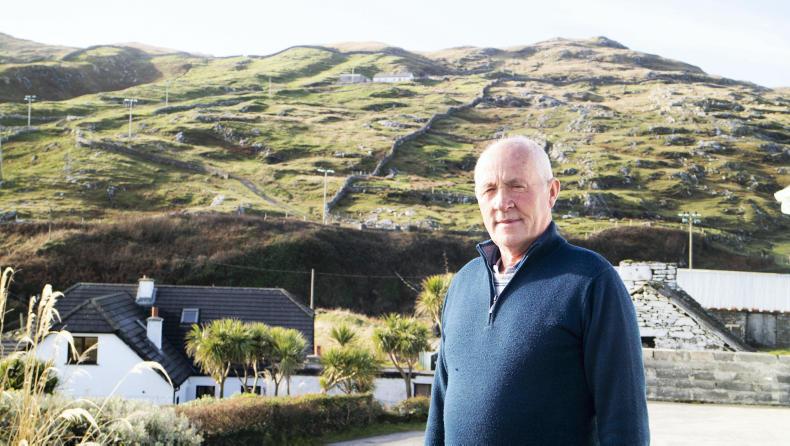


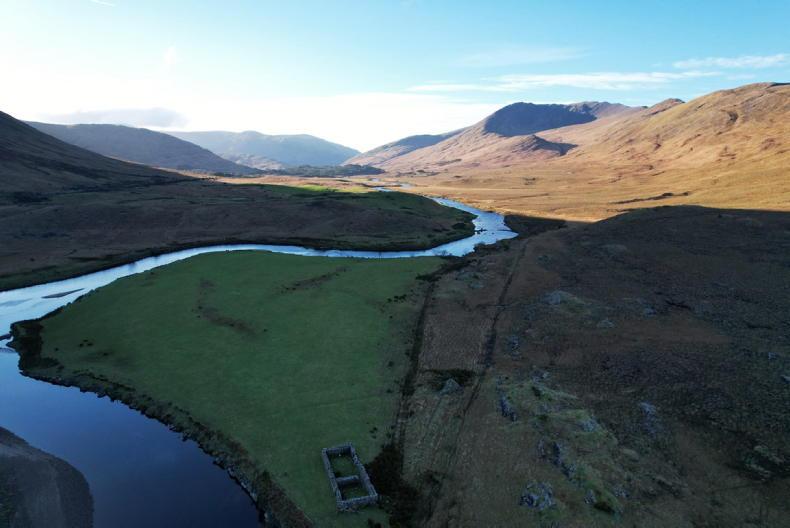
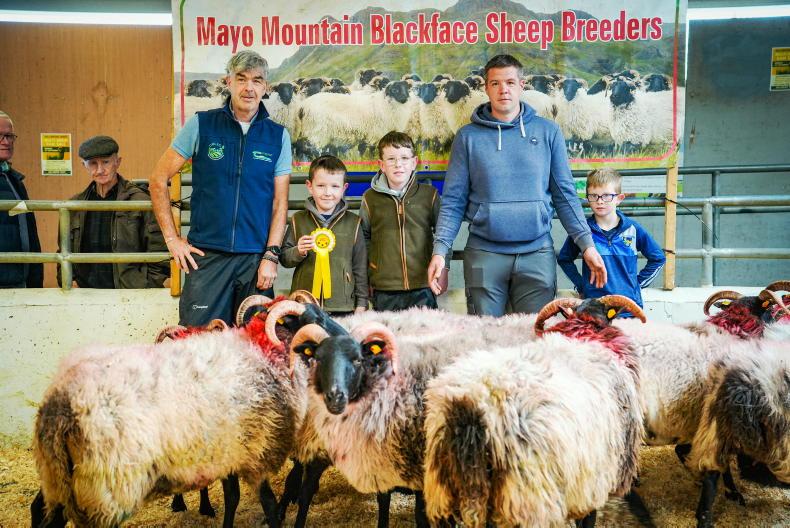
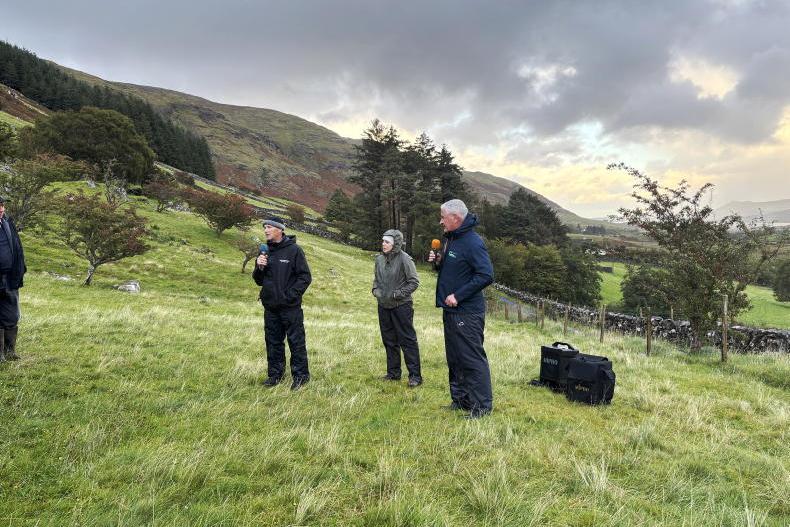
SHARING OPTIONS